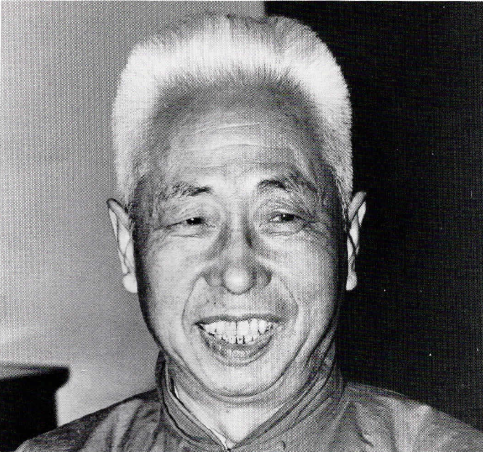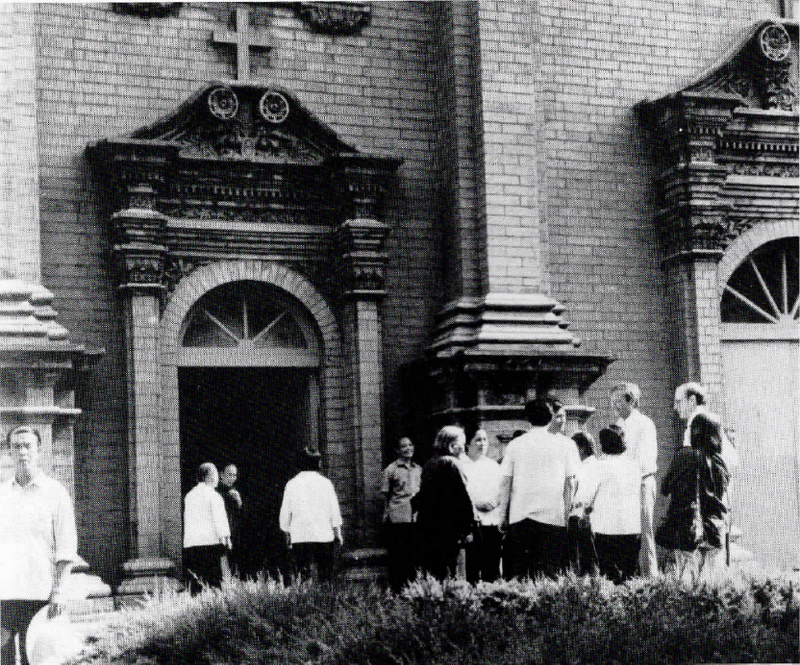Many Brethren in the United States have wondered what has happened to the Chinese Christians who were ministered to by Church of the Brethren missionaries such as the Brights, Harshes, Crumpackers, Florys, Smiths, Ikenberrys, Minneva Neher, Nettie Senger,and others. With travel much more opennow, many Americans are traveling to China and a number of Brethren missionary children are making the trek back to their childhood land. Their related experiences give us glimpses of the faithfulness of these Chinese Christians in difficult times. The long ago mission efforts of the Church of the Brethren, it seems, have been like dormant seeds. Plants from them are flourishing today in China.
My husband, Ivan, and I, who are in a year of Brethren volunteer teaching in China through the World Ministries Commission, spent some time with 78- year-old Pastor Yin Ji Zeng during our orientation in Beijing. His story is one of those "plants."
Yin Ji Zeng was born October 31,1910, in Shandong Province. His family moved to Shanxi Province when Yin Ji Zeng was 18 months old. Here he grew up in the Church of the Brethren. It was in this church that he learned many Bible stories. The primary school was operated by the church and had Bible classes as part of the curriculum. Pastor Yin spoke with great warmth of his years in Shanxi, remembering Frank Crumpacker and Ernest IkenbelTy as two Church of the
Brethren missionaries who were influential in his life, Yin Ji Zeng's father, Yin Han Zhang, was the first Chinese elder in the Church of the Brethren. He worked closely with Homer Bright.
At age 24 Yin Ji Zeng went to Shandong for four years of training in North China Theological Seminary. He then returned to Shanxi to help pastor the church at Ping Ding. Then he went to Shou Yang. In 1940 the Japanese drove the Christian missionaries out of China.
Pastor Yin went to Beijing in 1941, where he was introduced to the Presbyterian Church. There were 64 churches of different denominations, some of them large and some quite small. These churches in Beijing, united into four churches in 1958, were known as the Christian Churches of China. At this time the communist government sent Yin Ji Zeng to the countryside to work as a peasant laborer.
The government allowed Pastor Yin to come back to Beijing in 1961 to preach again. He preached for five years, until all the churches in China were closed in 1966. There were to be no meetings of any kind. Pastor Yin was sent to the country again. He was able sometimes to come home one day a week on his bicycle. Three of his four children were grown, but one l8-year-old was still at home, His wife, Wang Jing Xian, whom he had married in 1931, had to struggle alone.
US President Richard Nixon came to China in 1972 and China began shortly thereafter to open itself to foreigners. As the foreigners came to China they asked for a church in which to worship. So the government again called Pastor Yin back to Beijing, instructing him that the church must be opened every Sunday for services for the foreigners because they requested it. The church was to open only to foreigners. Pastor Yin protested that he could not do that, but the government said he had no choice, it was an order. He yielded. It was this Rice Market Street Church that George Bush, then the US Ambassador to China, attended. Pastor Yin baptized the Bushes' youngest daughter.
The period from 1966 to 1979 was a dark one for China. During the Cultural Revolution, religion, along with culture and education, was to be destroyed. Many temples, churches, and other buildings were burned or torn down. Throughout China there are many Buddhist statues. Today some of the smaller Buddha figures are without heads because they were maliciously knocked off. During this period Christians, like their first-century forerunners, were afraid to speak. In Beijing one Christian family lived among non-Christian families. Anyone could be reported as a Christian and be beaten, jailed, or maltreated in other ways. The Christians could not even teach their children because they might inadvertently tell someone. There was no writing to friends or relatives. This might cause them much trouble. When Christians met at the market or on the street, they looked at each other with understanding but they did not speak. Pastor Yin was especially conscious of this because people knew he had been a Christian pastor. He didn't want anyone to get in trouble just by speaking to him. It was a lonely, fearful time-a time of mere survival.
It was not until 1979 that the Chinese were allowed once again to worship in their church. By now the foreigners were holding their own worship services in their embassies. The Chinese church wanted Pastor Yin to be its pastor. This was another dark night of the soul for him. His faith was much too small, he said. He had given up and believed the church could never be opened again. He felt the people's faith was much stronger than his. Yet they were calling him as their pastor.
In the midst of much inner turmoil Pastor Yin prayed for guidance. After one searching prayer time, a voice said to him, "You are Peter." Peter, he thought the one who three times denied his Lord, yet was forgiven, and became a bulwark of the early Christian Church. The anguish, the turmoil was lifted and Yin Ji Zeng felt the Lord's forgiveness and he, too, continues ministering as a servant of the Lord in today's church.
On Easter Sunday the church was reopened. It was like a Resurrection experience. People cried openly as they entered their church for the first time in 13 years.
Pastor Yin also was chairman of the Three-Self Movement. This is a Christian council that emphasizes the Chinese church as self-supporting, self governing, and self-propagating.
When the church reopened in 1979 the congregation was composed of all older people. There were no young people. The Rice Market Street Church, however, was soon too small. It has seats for only 100 people. It asked the government for help.
The church was given another place, which soon was too full. Then it was given another. Today this congregation is made up of six large churches. Pastor Yin was one of four pastors until 1986 when he started and became president of the Yanjing Theological Seminary on Dong-Dan North Street in Beijing - the same location as the old Rice Market Street Church.
Pastors of the churches were in their late 60s or 70s. Pastor Yin was concerned about the need to train young people to carry on pastoral leadership. He started the seminary with 17 students just from Beijing. Today there are 70 young men and women from 10 northwest provinces in China. We visited with these young seminary students and were impressed with their intelligence and their joyous faith. As we talked with some of these dedicated Christians, we could see and feel the love and respect they had for their teacher, Pastor Yin. From 1962-1982 there were no seminaries in China. Today there are 12.
In 1979 there were 700,000 Christians in China. Today there are 4,000,000. When I asked Pastor Yin about the reason for this phenomenal growth in nine years after such a devastating period, his reply came quickly and with certainty-"The lay people! The members do the witnessing. This is the reason why the church is growing."
Pastor Yin is pleased to see so many interested young people in the ministry. None pleases him more, however, than his ministerial grandson, Yin Hun Tal. He studied at Nanjing Seminary for two years. This year he is doing a year of service in Beijing. Then he will return to Nanjing Seminary for two more years before assuming a pastorate.
From early beginnings in the Church of the Brethren mission at Ping Ding in Shanxi Province to the presidency of Yanjing Seminary, Pastor Yin's Christian pilgrimage has been remarkable. His message to the Church of the Brethren in the USA is: "We are all one. We are one with the whole world. We are all one body in Christ. God, the true and living God, is with us forever."
(Dorotha Winger Fry, of Fort Wayne, Ind., is a volunteer teacher in Nanjing, China, through the Brethren/China Exchange program of the Church of the Brethren World Ministries Commission.)
The article was originally posted on Messenger, the primary periodical for the Church of the Brethren, in January 1989.













